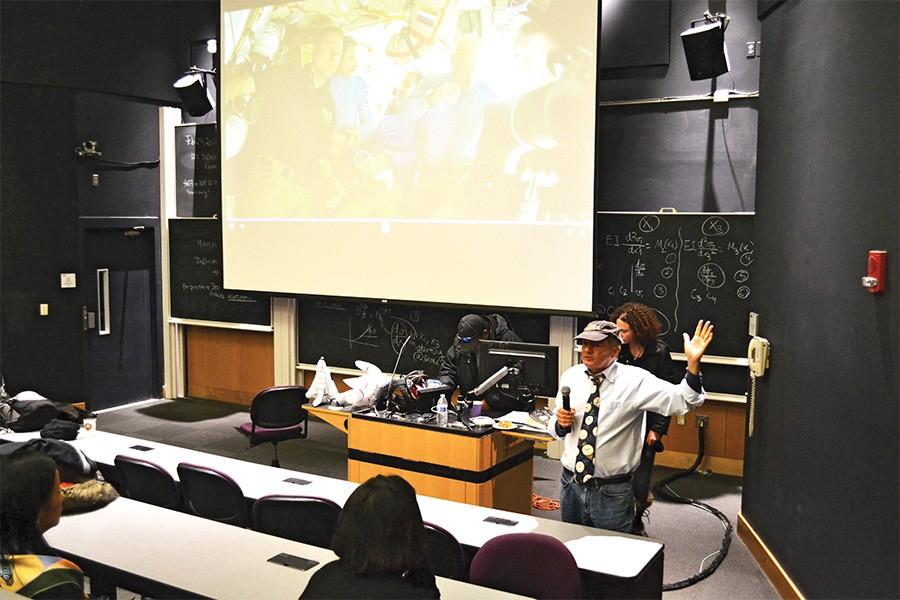Astronaut Scott Kelly returns home from longest American space trip, studied by Northwestern
Josh Kaplan/The Daily Northwestern
Biology Prof. Fred Turek discusses the scientific research conducted on astronaut Scott Kelly and his twin brother at a party for the former’s return to Earth Tuesday. Northwestern investigators, whose research focused on bacteria in the gastrointestinal tract, made up one of 10 research teams studying the twins to determine the effects of space travel on human biology.
March 2, 2016
After nearly a year in space, astronaut Scott Kelly came back to Earth Tuesday night, an event Northwestern researchers and students celebrated with a homecoming party as they watched a live video feed from the National Aeronautics and Space Administration.
Approximately 35 people gathered in Abbott Auditorium in the Pancoe Life Sciences Pavilion to watch the departure and landing of Kelly, one of two twins being studied by NU researchers in partnership with NASA. The coverage featured Kelly, along with two other astronauts, undocking from the International Space Station, boarding the Soyuz spacecraft and landing in Kazakhstan.
The NU researchers will now continue their studies on the effects of spaceflight on the human body with Kelly in person now that he has returned to Earth.
The landing concluded Scott Kelly’s 340-day orbit, the longest trip to space ever taken by an American astronaut. Kelly and his twin brother, Mark, are part of a 10-team study analyzing the effect of interstellar travel on humans. As one of the teams conducting the analysis, NU researchers will focus on space travel’s effects on bacteria in the human gastrointestinal tract.
During the live video feed coverage, biology Prof. Fred Turek and neurobiology Prof. Martha Vitaterna discussed the importance of unraveling how gut microbiota affects mood. Because astronauts must work as a team and live in cramped conditions, any symptoms of depression or anxiety caused by gut bacteria can be detrimental, said Turek.
“We just want to know what it takes to keep people healthy in space for that long,” said Vitaterna, who is also the executive director of the Center for Sleep and Circadian Biology at NU. “Today is a really historic event. You have to step back and think about that.”
Scott Kelly worked with NU researchers by providing samples of fecal matter and blood to be compared with his twin brother’s, said Turek.
Because of the small dimensions of Russia’s Soyuz spacecraft, the samples will be retrieved by a shuttle from Space X, an American aerospace manufacturer. This shuttle will also deliver 20 “mousetronauts,” whose genetically identical twins will remain on earth, for another experiment on gut bacteria, said Turek.
Vance Gao, a graduate student in NU’s Interdepartmental Neuroscience Program who is studying under Turek, said he was looking forward to analyzing the evidence.
“It’s pretty incredible, just thinking about all the engineering and science that’s involved,” Gao said. “We’re really not sure what to expect (from the results of the experiment).”
NASA provided a live stream of events from mission control centers in both Houston and Korolev, Russia. Later in the evening, Scott Kelly and Russian cosmonauts Mikhail Kornienko and Sergey Volkov could be seen aboard Russia’s Soyuz spacecraft, seated in the descent module. The module was the only portion of the shuttle that would survive the 249 mile freefall back to earth, said Turek.
During a broadcasted change of command ceremony, Scott Kelly acknowledged his colleagues’ support and relinquished command of the ISS to fellow astronaut Tim Kopra.
“It’s bittersweet,” said Scott Kelly, whose feet were strapped to the ground to keep him from floating.
Throughout the space flight, researchers performed more than 400 experiments on Scott Kelly, Turek said. Seeing little things, such as Scott Kelly’s picture of a flower grown in space, made him realize the rewards of their hard work, Turek said.
“I’m involved in something that’s bigger than what I do in life — bigger than my science,” he said. “I’m involved in something no human being has ever done before.”
Email: [email protected]
Twitter: @AnikaHopeee


